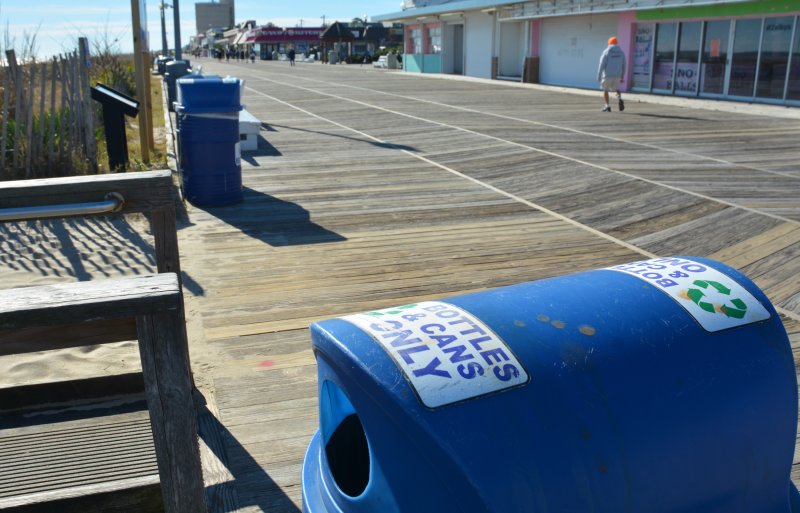The good news: Rehoboth Beach’s Boardwalk recycling program saw more than a 100% increase in the number of bags recycled this summer compared to last summer. The bad news: the recycling rate went from 3.75% in 2024 to 7.65% in 2025.
The contamination rate is still higher than desired, but there were significant improvements, said Public Works Director Henry Matlosz, during an end-of-the-summer report at a commissioner meeting Oct. 17.
“Believe it or not, this is a huge improvement over last year,” he said.
The city placed dozens of recycling bins on the Boardwalk in 2022 and, in an effort to decrease contamination rates, has continued to modify the program, including more frequent pickup and the installation of pizza box disposal bins.
Despite the efforts, contamination remains high. In 2024, there were a total of 30 contamination-free recycling bags of the 800 bags collected. In 2025, there were 69 bags recycled out of 901 bags collected, said Matlosz, in an email after the meeting.
Progress was small, but it was progress, and Matlosz credited a training session with Delaware Department of Natural Resources and Environmental Control officials as a reason for improvement. The additional training helps the streets department better determine what can and can’t be recycled, he said.
Looking to next year, the city will again have the state train staff and will probably post information at the beginning of the season to remind people to put only bottles and cans in the recycling bin, said Matlosz. Both of these actions will hopefully improve the percentages, he said.
The city also has a recycling yard for residents and businesses off Oyster House Road. During the meeting, Matlosz said businesses used the facility 264 times, while it was used 388 by residential property owners. The city had to turn away 23 nonresidents, he said.
As for refuse collected, Matlosz said the amount was fairly similar over the past three years, with a peak of about 300 tons in July.
Water and wastewater usage
Matlosz also presented commissioners with information on water and wastewater usage during the summer months.
Last year, in response to a record level of water usage and to help spread out the demand, city officials encouraged customers to use their irrigation systems on alternating days immediately following the Fourth of July weekend. The city treated more than 3.5 million gallons of water per day July 5 and July 6. The next day, July 7, it was 3.4 million gallons.
According to information from Matlosz, there were more than 3 million gallons of water treated July 3, 4, 5 and 6 this year, with a peak July 5 of 3.43 million gallons.
Water use is fairly similar over the past three years, said Matlosz, pointing to peak usage of the system around the Fourth of July holiday. The implementation of asking property owners to irrigate on alternating days – odd addresses one day, even addresses another – doesn’t really decrease demand but helps flatten out demand, he said.
Additionally, the interconnection with Tidewater was completed this summer, which helps with system resilience, said Matlosz.
As for wastewater, the city’s treatment plant is permitted to treat up to 3.4 million gallons per day. Matlosz said it remains rare to see days with more than 3 million gallons per day treated. In 2024, there was one day of 3.09 million gallons, while in 2025, July 5 was the peak at 2.7 million gallons.
Chris Flood has been working for the Cape Gazette since early 2014. He currently covers Rehoboth Beach and Henlopen Acres, but has also covered Dewey Beach and the state government. He covers environmental stories, business stories and random stories on subjects he finds interesting, and he also writes a column called Choppin’ Wood that runs every other week. He’s a graduate of the University of Maine and the Landing School of Boat Building & Design.






















































